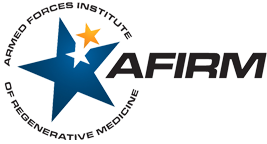The Rutgers-Cleveland Clinic Consortium (RCCC) is part of the Armed Forces Institute of Regenerative Medicine (AFIRM), a multi-institutional, interdisciplinary network working to develop advanced treatment options for our severely wounded servicemen and women. The AFIRM is managed and funded through the US Army Medical Research and Materiel Command (MRMC); with additional funding from the US Navy, Office of Naval Research, the US Air Force, Office of the Surgeon General, the National Institutes of Health, the Veterans Administration, and local public and private matching funding.
AFIRM’s mission is to develop new products and therapies to treat severe injuries suffered by US service members in the current wars. The AFIRM teams, working in research laboratories and clinics across the country, are advancing biological therapies (including adult stem cells and growth factors), tissue and biomaterials engineering, and advanced transplantation methods. These new treatments will enable the body to repair, replace, restore and regenerate damaged tissues and organs.
The RCCC consists of 25 research teams that are developing promising biomaterials, cell-based and combined regenerative medicine technologies that will someday become new commercial products to restore lost tissue and lost function. In an effort to advance the commercialization of many of these products, the RCCC has forged collaborations with nearly 20 industrial partners. The planned therapies will not only be available to the wounded warriors, but also civilian trauma and burn patients as well.
In addition to the cutting edge research and development programs, the Rutgers-Cleveland Clinic Consortium currently has 5 clinical trials underway, enabling therapies for some of the most difficult challenges military medicine faces in the care of severely injured warriors:

To learn more about the Armed Forces Institute of Regenerative Medicine (AFIRM) and its research and clinical trials visit www.afirm.mil